|
|
|
Sort Order |
|
|
|
Items / Page
|
|
|
|
|
|
|
| Srl | Item |
| 1 |
ID:
163069
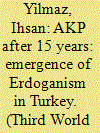

|
|
|
|
|
| Summary/Abstract |
In recent years, several observers of Turkey have recognised a novel development in Turkish politics: the rise of Erdoganism. President Recep Tayyip Erdoğan’s personality and style have come to embody the Turkish nation, the state and its economic, social and political institutions. But what is Erdoganism? What are its main attributes? Is it a mere ideology or the name of the emerging political regime in Turkey? While commentators have provided several observations of Erdoganism, it has not been duly examined on its own in the academic literature. This paper’s main premise is that in Turkey, a new political regime has emerged in recent years which can best be defined as Erdoganism. Erdoganism has four main dimensions: electoral authoritarianism as the electoral system, neopatrimonialism as the economic system, populism as the political strategy and Islamism as the political ideology. We first explain why we think Erdoganism is a better concept to define the emerging political regime in Turkey. We briefly discuss Sultanism, Khomeinism and Kemalism in order to produce a set of references for our discussion of Erdoganism. We then provide a thorough analysis, explaining the ways in which Erdoganism manifests itself through electoral authoritarianism, neopatrimonialism, populism and Islamism.
|
|
|
|
|
|
|
|
|
|
|
|
|
|
|
|
| 2 |
ID:
163064
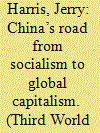

|
|
|
|
|
| Summary/Abstract |
China’s engagement with global capitalism is driven by the emergence of a statist and private transnational capitalist class. Nevertheless, aspects of China’s foreign policy from the Maoist period still echo today. Consequently, elements of third world solidarity and opposition to Western domination continue to exist as China’s past is redefined to further its transnational strategies in Latin America and the US. The main Chinese investments in South America have been in energy and infrastructure among the left lead countries of the Pink Tide. In the US, Chinese capital has grown despite heated political rhetoric. This paper will examine how economic ties in South and North America reflect past and present conditions, and if China has initiated a non-Western globalisation.
|
|
|
|
|
|
|
|
|
|
|
|
|
|
|
|
| 3 |
ID:
163068
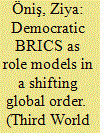

|
|
|
|
|
| Summary/Abstract |
India, Brazil and South Africa constitute an important subset of Brazil, Russia, India, China and South Africa (BRICS) and emerging powers at large in a shifting global order. The article examines the capacity of these democratic BRICS to serve as a role model to the rest of the developing world, at a time when liberal democracy seems to be experiencing serious challenges and dislocations in the Global North. The article considers the important achievements of democratic BRICS, in terms of their individual performances as well as through active cooperation strategies through organisations such as the India, Brazil and South Africa (IBSA) Dialogue Forum. Attention is drawn to the inherent structural dilemmas confronted by democratic BRICS to serve as genuine role models, given their domestic weaknesses as well as inherent constraints on their collective action strategies. Our central argument is that these countries, individually and collectively, are likely to have a crucial bearing on the future of liberal democracy on a global scale.
|
|
|
|
|
|
|
|
|
|
|
|
|
|
|
|
| 4 |
ID:
163066
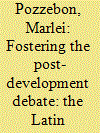

|
|
|
|
|
| Summary/Abstract |
This essay revisits the historical development of a concept – tecnologia social – as one avenue for discussing alternatives to post-development, arguing that the Western-based historical path of technology development is one of the main sources of growing human impoverishment, social inequalities and economic dependency. The concept of tecnologia social points towards political processes that create opportunities to redefine the arrangements among social groups, artefacts and methods used in everyday life, particularly for production and consumption. Because the post-development debate has been criticised for formulating a sound and strong critique to mainstream development but failing to propose concrete empirical alternatives, we seek to foster the debate through the Latin American concept of tecnologia social.
|
|
|
|
|
|
|
|
|
|
|
|
|
|
|
|
| 5 |
ID:
163065


|
|
|
|
|
| Summary/Abstract |
There are many studies on the effects of both economic globalisation and the rise of China. These core issues of the contemporary international agenda entail major economic, military, environmental, social and cultural transformations in most nations. While there is also an abundant literature on how globalisation supported the rise of China, there are scarce publications on how China became one of the primary drivers of globalisation. This article assumes that understanding the power of globalisation over countries is as crucial as assessing the power of certain countries over the process. In this sense, it uses the recently created ‘theory of globalisers’ to analyse how is China transforming contemporary economic globalisation. The conclusion is that China became an ‘economic globaliser’ in the twenty-first century. As the largest exporter, the second largest importer, the third largest provider of foreign direct investments, and a major supplier of high-tech goods, the Asian giant is a vital partner for several economies in different continents. In this context, Beijing’s globalisation strategy aims at both securing the benefits of globalisation and reforming the international economic order, but without a revolutionary stance.
|
|
|
|
|
|
|
|
|
|
|
|
|
|
|
|
| 6 |
ID:
163062
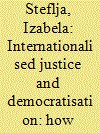

|
|
|
|
|
| Summary/Abstract |
This article examines the relationship between international criminal justice and democratisation processes in post-conflict settings, illustrating that international tribunals did not contribute to democratisation in the cases of Serbia, Kosovo and Rwanda. The argument that tribunals have willingly or inadvertently empowered local non-reformist factions is rooted in the agency of local elites. The findings suggest prioritisation of international over localised knowledge, political over victim interests and stability over judicial independence. This article makes a contribution to the emerging, critical literature on the dynamics between institutions of international criminal law and their socio-political environments, drawing attention to volatile effects of internationalised justice.
|
|
|
|
|
|
|
|
|
|
|
|
|
|
|
|
| 7 |
ID:
163070


|
|
|
|
|
| Summary/Abstract |
Norm contestation by local actors has emerged in recent years as an explanation for the failure of norm diffusion. This article contributes to the literature on norm contestation by analysing how norms diffused by the Organisation for Security and Cooperation in Europe (OSCE) pertaining to election observation and free and fair voting are re-constituted and contested by domestic actors in Kazakhstan. The study contributes to the idea of ‘constitutive localisation’ by emphasising a more fundamental level of disagreement beyond just congruence between the diffused norm and local beliefs; by demonstrating contestation can occur in the later stages in the norm diffusion cycle; by focusing on the micro-politics of contestation by local actors involved in the implementation of diffused norms; and by revealing how norm contestation is not necessarily a process of emancipatory politics, but a strategic act to serve authoritarian consolidation. Utilising a four-fold framework, the analysis illustrates how norms, while initially accepted by Kazakhstani authorities, are reconstituted through political discourse and/or practice, creating the moment of contestation. While this contestation is instrumentalised by political elites for their own advantage, it also remains an important element of agency within a normative order which they had little previous control over.
|
|
|
|
|
|
|
|
|
|
|
|
|
|
|
|
| 8 |
ID:
163071


|
|
|
|
|
| Summary/Abstract |
This article considers how Nelson Mandela’s immediate family members intellectualised themselves within his legacy when he was terminal and upon his death. These specifics sublimate and set him apart from the eulogising tendency such as it has energised the scholarship on him. The tactics highlight tradition as an analytical category. Citing succession as a key episteme, the discussion delineates how tradition rarefies in non-hegemonic, mobile and fragile subject positions. In this approach, the paper invokes subtleties in the African Customary Law of Succession in South Africa.
|
|
|
|
|
|
|
|
|
|
|
|
|
|
|
|
| 9 |
ID:
163063


|
|
|
|
|
| Summary/Abstract |
The nature and dynamics of ownership are often neglected features of multi-stakeholder initiatives (MSIs). Seventeen cases in four countries illustrate characteristics of narrow government or broad societal ownership and forces for change over time. Refinements to the application of Gaventa’s Power Cube are used to analyse such shifts from the perspective of invited and closed spaces for participation. Observations about ways in which stakeholder groups can create a more enabling environment for their collaboration are discussed. Sensitivity to sub-national conditions by weaving endogenous and exogenous forces appears to be crucial if MSIs are to be effective vehicles of choice for implementing the Sustainable Development Goals.
|
|
|
|
|
|
|
|
|
|
|
|
|
|
|
|
| 10 |
ID:
163067


|
|
|
|
|
| Summary/Abstract |
This study attempts to analyse Turkey’s contribution to the United Nations (UN) system in comparison with those of the Brazil, Russia, India, China, and South Africa (BRICS) countries between 2008 and 2014 on three levels: personnel, financial, ideational. Employing an integrated methodology of a global governance contribution index (GGCI) and statistical analysis of complementary raw data, this study empirically reveals the degree to which Turkey was able to transfer its capabilities into an effective contribution to the UN system on the three levels. Drawing on the findings of its quantitative analysis, this paper further qualitatively assesses the reasons behind the gap between Turkey’s global governance motivations and its contribution to the UN system. In doing so, this study, first, deals with the main motivational drivers of its activism in global governance in the 2000s. After unpacking its integrated methodology, the second part of this study quantitatively compares Turkey’s contribution to the UN system to that of the BRICS. The third part of this study delves into the main trends and deficiencies in Turkey’s contribution to the UN system. Finally, this study concludes that Turkey, despite its high motivations for activism in global governance, has not performed well in transferring its capacities into contributions to the UN system, particularly on financial and personnel levels.
|
|
|
|
|
|
|
|
|
|
|
|
|
|
|
|
|
|
|
|
|